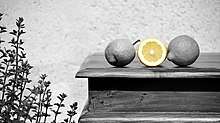When life gives you lemons, make lemonade
When life gives you lemons, make lemonade is a proverbial phrase used to encourage optimism and a positive can-do attitude in the face of adversity or misfortune. Lemons suggest sourness or difficulty in life; making lemonade is turning them into something positive or desirable.[1]

Origins
The phrase was initially coined by Christian anarchist writer Elbert Hubbard in a 1915 obituary he penned and published for dwarf actor Marshall Pinckney Wilder.[2] The obituary, entitled The King of Jesters, praises Wilder's optimistic attitude and achievements in the face of his disabilities:
"He was a walking refutation of that dogmatic statement, Mens sana in corpore sano. His was a sound mind in an unsound body. He proved the eternal paradox of things. He cashed in on his disabilities. He picked up the lemons that Fate had sent him and started a lemonade-stand."[3]
Although the expression was coined by Hubbard,[4][5][6] many modern authors[7][8] attribute the expression to Dale Carnegie who used it in his 1948 book How to Stop Worrying and Start Living. Carnegie's version reads:
"If You Have a Lemon, Make a Lemonade."[9]
Carnegie credited Julius Rosenwald for giving him the phrase.
Variations
The September 1916 edition of the Auburn Seminary Record was the first to publish the phrase following its initial coinage:
"[Hugh K. Walker] described a pessimist as one who fletcherizes his bitter pill, the optimist as the man who made lemonade of the lemon handed him."[10]
Eight years before Carnegie's book brought the phrase back into the mainstream, a poetic rendition of the phrase entitled The Optimist appeared in a 1940 edition of The Rotarian:
"Life handed him a lemon,
As Life sometimes will do.
His friends looked on in pity,
Assuming he was through.
They came upon him later,
Reclining in the shade
In calm contentment, drinking
A glass of lemonade."[11]
In 1944, during Homer E. Capehart's first run for Senate, he became known for saying:
"I have never been afraid of trouble. I have always had this slogan: If somebody hands you a lemon, make lemonade of it."[12][13][14]
In popular culture

Warren Hinckle's 1974 autobiography detailing his time as chief editor of Ramparts is called If You Have a Lemon, Make Lemonade.[15]
The initial opening theme for Mystery Science Theater 3000 included the lyric "Joel says when you got lemons, you make lemonade." This was changed when the show was broadcast nationally.
The saying has become a popular calque in Hispanic culture.[7]
The video game Portal 2 includes a joke about the character Cave Johnson getting angry at the proverbial phrase: "When life gives you lemons, don't make lemonade. Make life take the lemons back! Get mad! I don't want your Damn lemons, what the hell am I supposed to do with these? Demand to see life's manager! Make life rue the day it thought it could give Cave Johnson lemons! Do you know who I am? I'm the man who's gonna burn your house down! With the lemons! I'm gonna get my engineers to invent a combustible lemon that burns your house down!"
In 2016, Beyoncé released her sixth album titled Lemonade. The album's theme stems from a quote from Jay-Z's grandmother, Hattie White, featured on the album at the end of track 10 "Freedom", when she says, "I had my ups and downs, but I always find the inner strength to pull myself up. I was served lemons, but I made lemonade."
Also, in his Song Rap God (from the album “The Marshall Mathers LP 2”, 2013) Eminem quotes “[…] life’s handing you lemons, make lemonade then […]”
See also
References
- "When life gives you lemons". Theidioms.com. The Idioms. Retrieved June 16, 2020.
- Hubbard, Elbert (1922). Selected Writings of Elbert Hubbard. V. Wm. H. Wise & Co./The Roycrofters. p. 237. Alt URL
- Hubbard, Elbert (February 1915), "The Fra: A Journal of Affirmation", The Fra, Elbert Hubbard, vol. 14 no. 5, p. xxiv–d Alt URL
- "The Reader's Digest of Lasting Interest", Reader's Digest, no. 66, p. 343, October 1927 Alt URL
- "Public Libraries: A monthly review of library matters and methods". 25. Chicago: Library Bureau. 1920: 268. Cite journal requires
|journal=(help) - "Forbes, Volumes 10–11", Forbes, vol. 10–11, p. 185, 1922
- McKenna, Kevin J. (2009). The Proverbial "Pied Piper". Peter Lang Publishing. p. 55. ISBN 143310489X.
- Keyes, Ralph (2006). The Quote Verifier: Who Said What, Where, and When. St. Martin's Griffin. pp. 118–119. ISBN 0312340044.
- Carnegie, Dale (1948). How to Stop Worrying and Start Living. Simon & Schuster. p. 138. ISBN 0671733354.
- Auburn Seminary Record, 12, Auburn Theological Seminary, July 10, 1916, p. 313 Alt URL
- Flynn, Clarence Edwin (November 1940), The Rotarian, 57, The Rotarian, p. 62
- The Fraternal Monitor, 55–56, 1944, p. 51
- "Capehart Wins Indiana GOP Nomination for U.S. Senate", The Billboard, p. 64, June 10, 1944
- The Business education world, 26, 1945, p. 27
- Hinckle, Warren. If You Have a Lemon, Make Lemonade. W. W. Norton & Company. ISBN 0393306364.